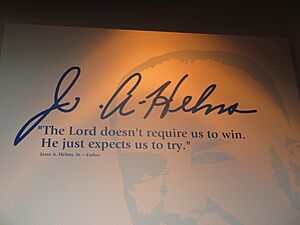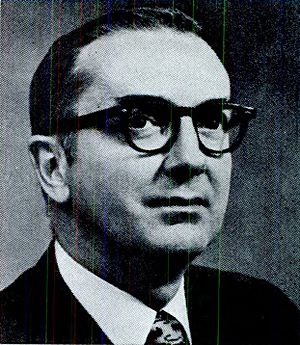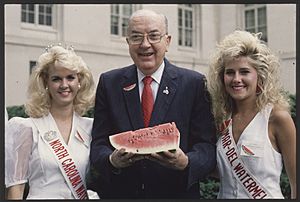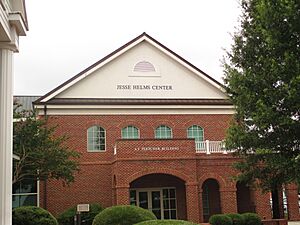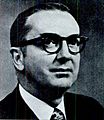Jesse Helms facts for kids
Quick facts for kids
Jesse Helms
|
|
|---|---|
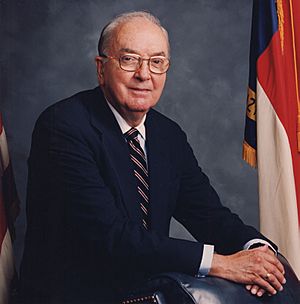 |
|
| United States Senator from North Carolina |
|
| In office January 3, 1973 – January 3, 2003 |
|
| Preceded by | B. Everett Jordan |
| Succeeded by | Elizabeth Dole |
| Chair of the Senate Foreign Relations Committee | |
| In office January 20, 2001 – June 6, 2001 |
|
| Preceded by | Joe Biden |
| Succeeded by | Joe Biden |
| In office January 3, 1995 – January 3, 2001 |
|
| Preceded by | Claiborne Pell |
| Succeeded by | Joe Biden |
| Chair of the Senate Agriculture Committee | |
| In office January 3, 1981 – January 3, 1987 |
|
| Preceded by | Herman Talmadge |
| Succeeded by | Patrick Leahy |
| Personal details | |
| Born |
Jesse Alexander Helms Jr.
October 18, 1921 Monroe, North Carolina, U.S. |
| Died | July 4, 2008 (aged 86) Raleigh, North Carolina, U.S. |
| Resting place | Historic Oakwood Cemetery right |
| Political party | Democratic (before 1970) Republican (1970–2008) |
| Spouses |
Dot Coble
(m. 1942) |
| Children | 3 |
| Parent |
|
| Education | Wingate University Wake Forest University |
| Military service | |
| Allegiance | |
| Branch/service | |
| Years of service | 1942–1945 |
| Battles/wars | World War II |
Jesse Alexander Helms Jr. (October 18, 1921 – July 4, 2008) was an American politician. He was a major leader in the conservative movement. Helms served as a senator for North Carolina from 1973 to 2003.
As chairman of the Senate Foreign Relations Committee from 1995 to 2001, he had a big say in how the U.S. dealt with other countries. Helms helped start and fund the conservative movement in the 1970s. He supported Ronald Reagan's run for president and helped many other politicians.
On social issues in the U.S., Helms was against civil rights, disability rights, environmentalism, feminism, gay rights, and affirmative action. He was known for his strong opinions. The Almanac of American Politics once said that "no American politician is more controversial, beloved in some quarters and hated in others, than Jesse Helms".
Helms was the longest-serving popularly elected Senator in North Carolina's history. He is often given credit for changing North Carolina from a state mostly controlled by one political party to one with two strong parties. He encouraged conservatives to leave the Democratic Party and join the Republican Party.
Contents
- Early Life and Education (1921–1940)
- Family Life
- Starting His Career (1940–1972)
- First Senate Term (1973–1979)
- Second Senate Term (1979–1985)
- Third Senate Term (1985–1991)
- Fourth Senate Term (1991–1997)
- Fifth Senate Term (1997–2003)
- After the Senate (2003–2008)
- Social and Political Views
- Religious Views
- Awards
- Selected Works
- Images for kids
- See also
Early Life and Education (1921–1940)
Jesse Helms was born in 1921 in Monroe, North Carolina. His father, called "Big Jesse," was the fire chief and police chief. His mother, Ethel Mae Helms, stayed at home. The Helms family was not rich during the Great Depression. All the children worked from a young age. Jesse's first job was sweeping floors at The Monroe Enquirer when he was 9.
Helms briefly went to Wingate Junior College, now Wingate University. He then went to Wake Forest College. He left college after a year to become a journalist. For 11 years, he worked as a newspaper and radio reporter. He was a sportswriter and news reporter for Raleigh's The News & Observer. He also worked as an assistant city editor for The Raleigh Times.
Family Life
Helms met Dorothy "Dot" Coble, who was an editor at The News & Observer. They got married in 1942. Helms became interested in politics from talking with his conservative father-in-law. In 1945, their first child, Jane, was born.
Jesse and Dot had two daughters, Jane and Nancy. They also adopted a nine-year-old boy named Charles. Charles had cerebral palsy. They adopted him after reading in a newspaper that he wanted a family for Christmas. The couple had seven grandchildren and one great-grandchild.
Starting His Career (1940–1972)
Helms's first full-time job after college was as a sports reporter for The Raleigh Times. During World War II, Helms served in the United States Navy as a recruiter in the U.S.
After the war, he continued his work in journalism and Democratic Party politics. Helms became the city news editor of The Raleigh Times. Later, he became a radio and television newscaster and commentator for WRAL-TV.
First Steps in Politics
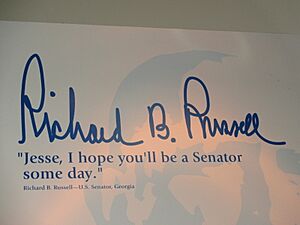
In 1950, Helms helped with the campaign for Willis Smith in the U.S. Senate race. Smith was a conservative Democrat. He ran against Frank Porter Graham, who supported school desegregation. Smith's campaign used messages that focused on race. Smith won and hired Helms as his assistant in Washington.
From 1953 to 1960, Helms was the executive director of the North Carolina Bankers Association. In 1957, Helms won his first election for a Raleigh City Council seat as a Democrat. He served two terms. He was known as a conservative who often disagreed with new projects.
In 1960, Helms joined the Capitol Broadcasting Company (CBC). He became a vice president and assistant chief executive. He gave daily editorials on WRAL-TV. These made him famous as a conservative commentator. His editorials often criticized the civil rights movement, the news media, and anti-war groups. He left CBC in 1972 to run for the Senate.
1972 Senate Campaign
Helms announced he would run for a seat in the United States Senate in 1972. He won the Republican primary easily. The Democrats chose Congressman Nick Galifianakis. Polls showed Galifianakis was ahead.
Helms hired a professional campaign manager, F. Clifton White. Helms used slogans like "McGovernGalifianakis – one and the same" and "Vote for Jesse. Nixon Needs Him." Helms also used the slogan "Jesse: He's One of Us," which hinted at his opponent's Greek background. Helms gained support from many Democrats, especially in the conservative eastern part of the state.
Helms spent a lot of money on his campaign, especially on TV commercials. He won with 54 percent of the vote. He became the first Republican senator from North Carolina since 1903. Helms was helped by Richard Nixon winning North Carolina by a large margin in the presidential election that year.
First Senate Term (1973–1979)
Starting in the Senate
Helms quickly became a "star" of the conservative movement. He strongly supported free enterprise and wanted to cut the government budget. He also wanted the U.S. to return to the gold standard. Helms supported the tobacco industry, which was very important to North Carolina. He argued that federal programs helping tobacco farmers were like insurance, not handouts.
Foreign Policy Views
Helms was a strong opponent of communism. In 1974, he suggested making Soviet writer Aleksandr Solzhenitsyn an honorary U.S. citizen. He believed Solzhenitsyn's fight was for freedom worldwide. In 1975, as North Vietnamese forces neared Saigon, Helms urged the U.S. to evacuate all Vietnamese who wanted to leave.
Helms was not always a strong supporter of Israel. In 1973, he suggested Israel return the West Bank to Jordan. In 1977, he was the only senator to vote against stopping American companies from joining the Arab League boycott of Israel. This was mainly because the bill also made it easier to do business with Communist countries. His views on Israel changed significantly in 1984.
Nixon's Resignation
Helms gave a Senate speech blaming liberal media for twisting the truth about Watergate. He questioned if President Nixon had a right to be seen as innocent until proven guilty. Helms met with President Nixon several times in 1973. He tried to cheer up the president and urged the White House to challenge its critics. Helms was against creating a Senate committee to investigate campaign practices. He thought it was a Democratic plan to hurt Nixon.
In August 1974, Newsweek listed Helms as one of 36 senators who might support Nixon if he were impeached. Nixon resigned days later. He stayed in touch with Helms after leaving office.
1976 Presidential Election
Helms supported Ronald Reagan for president in 1976. This support was very important for Reagan's victory in the North Carolina primary. This win helped Reagan challenge President Gerald Ford in the 1976 Republican National Convention. Helms and his campaign manager, Thomas F. Ellis, are credited with helping Reagan's campaign when it was struggling.
Helms was not happy when Reagan chose moderate Senator Richard Schweiker as his running mate. Helms and Strom Thurmond tried to convince Reagan to pick a more conservative person. In the end, Reagan lost to Ford at the convention. However, Helms's and Ellis's efforts helped Reagan become a strong contender. This set the stage for Reagan to win the presidency in 1980.
Panama Canal Treaties
Helms was against giving control of the Panama Canal to Panama. He called its building an "historic American achievement." He worried it would fall into the hands of "communist friends." In 1977, President Jimmy Carter started new talks to transfer the canal. Helms and Strom Thurmond led the opposition. Helms claimed that the transfer would hurt national security.
Helms threatened to slow down Senate business. He proposed 200 changes to a law. He knew most Americans were against the treaties. However, Helms's strong opposition made it easier for Carter to get the treaties passed.
1978 Re-election Campaign
Helms started campaigning for re-election in February 1977. He did not have a primary opponent. The Democrats chose Commissioner of Insurance John Ingram. Ingram was known for his low-budget campaigns. He focused on insurance rates and fighting "fat cats and special interests."
Helms raised $7.5 million, much more than Ingram. Helms used new direct mail strategies to raise money. Helms easily won re-election with 54.5 percent of the vote. He told his supporters it was a "victory for the conservative and the free enterprise cause throughout America."
Second Senate Term (1979–1985)
New Senate Term Goals
In 1981, Senator Helms was one of several Republican senators who called the White House. They expressed their unhappiness about Sandra Day O'Connor being nominated to the U.S. Supreme Court. Helms was also a leader for conservatives on the issue of school prayer. He proposed an amendment that would allow voluntary prayer in schools.
Helms joined the Senate Foreign Relations Committee. He was critical of President Carter's foreign policy. He was a leader of the group that supported Taiwan. Helms demanded that China promise not to use force against Taiwan.
Food Stamp Program
Helms was against the Food Stamp Program. He had already voted to reduce its size. As chairman of the Agriculture Committee, he wanted to cut its funding by 40 percent. Instead, Helms supported replacing food stamps with workfare. He also proposed cutting food stamp benefits for children who received school lunches. This idea caused a lot of disagreement, and he had to back down.
Helms also wanted to stop workers on strike from getting food stamps. He believed this would keep the government neutral in labor disputes. In 1988, the U.S. Supreme Court agreed with his position.
Economic Policies
Helms supported the gold standard as Agriculture Committee chairman. In 1981, he restored $200 million for school lunches by cutting foreign aid instead. He also warned against expensive farm subsidies. However, in 1983, he used his position to push for using U.S. dairy and wheat to help exports. This was part of a trade war with the European Union.
In 1982, Helms wrote a bill to create a federal flat tax of 10 percent. He was a leading voice for a balanced budget amendment. At the end of the 97th Congress, Helms led a filibuster against President Reagan's plan to increase the federal gasoline tax.
Social Issues
Helms wanted to discuss social issues like school prayer and the minimum wage. His support was key to C. Everett Koop becoming Surgeon General. Helms proposed an amendment to take school prayer out of the Supreme Court's control. This was seen as unconstitutional and was rejected.
In 1983, Helms hired Claude Allen, an African American, as his press secretary. This was notable because he had not had any African-American staff before.
In 1983, Helms led a 16-day filibuster against making Martin Luther King Day a federal holiday. He claimed it would cost too much money. Helms also said that Dr. King had connections with Communists. He ended the filibuster in exchange for a new tobacco bill. President Reagan signed the bill on October 19, 1983.
Latin America
When Republicans took control of the Senate, Helms became chairman of the Subcommittee on Western Hemisphere Affairs. He promised to "review all our policies on Latin America." He quickly focused on increasing aid to the Salvadoran government in its civil war. He also wanted to stop Nicaraguan and Cuban support for guerrillas in El Salvador.
Helms had close ties with the right-wing Salvadoran Nationalist Republican Alliance. He was against the appointment of Thomas R. Pickering as Ambassador to El Salvador. Helms claimed the CIA had interfered in the Salvadoran election in 1984.
Helms was a strong supporter of the Chilean dictator General Augusto Pinochet. He was also strongly against the Castro government in Cuba. In 1981, he proposed a law to create Radio Free Cuba, which later became Radio Martí.
1984 Re-election Campaign
Helms ran for his Senate seat again in 1984. He faced Governor Jim Hunt. This was one of the most expensive Senate campaigns at the time. Helms won narrowly, taking 51.7 percent of the vote to Hunt's 47.8 percent.
Third Senate Term (1985–1991)
In 1989, Helms hired James Meredith, the first African American admitted to the University of Mississippi, as a policy adviser. Meredith said Helms was the only senator who responded to his offer.
In 1989, Helms helped pass an amendment to the Americans with Disabilities Act. This law protects disability rights. His amendment excluded schizophrenia and kleptomania from the conditions protected against discrimination. Helms voted against the final bill twice, even with his amendment included.
Foreign Policy Actions
Helms became the senior Republican on the Foreign Relations Committee. He pushed for changes at the United Nations and blocked payments of U.S. dues. Helms got enough changes that Joe Biden said, "As only Nixon could go to China, only Helms could fix the U.N."
Helms was a long-time critic of Manuel Noriega in Panama. In 1986, he held hearings that showed how much freedom the U.S. government had given Noriega. Helms worked with John Kerry to demand that the CIA investigate Panama's military. In 1988, Helms suggested that the U.S. suspend the Panama Canal treaties unless Noriega was sent to the U.S.
In July 1986, after a young man was killed in Chile during a protest against General Augusto Pinochet, Helms said the man was a "Communist terrorist." Helms also criticized the U.S. Ambassador to Chile for attending the funeral.
Helms became interested in the Vietnam War POW/MIA issue. In 1990, a report from his staff said it was likely that American prisoners were still held in Vietnam. The report also claimed the U.S. government was hiding information. Helms later fired some staff members involved with this report and distanced himself from the issue.
Public Health Funding
In 1987, Helms added an amendment to a spending bill. This amendment said that HIV infection should be on the list of diseases that prevent travel and immigration to the United States. The U.S. Public Health Service was against this. In 1990, Congress allowed the president to remove HIV from the list. However, a letter-writing campaign led by Helms convinced President Bush not to lift the ban. This made the U.S. the only developed country to ban travel based on HIV status. The ban was finally lifted in 2010 by President Barack Obama.
In 1988, Helms convinced Congress to ban federal funding for certain public health programs.
1990 Re-election Campaign
Helms ran for re-election in 1990 against Harvey Gantt. Gantt was the former mayor of Charlotte. He was trying to become the first black senator elected from the South since the Reconstruction era. Helms won the Republican primary easily.
During the general election, the North Carolina Republican Party sent out over 125,000 notices. These notices, sent mostly to black voters, incorrectly said they were not allowed to vote. The U.S. Department of Justice sued the Helms campaign and others. They agreed to stop these activities.
Helms also ran a controversial TV commercial called "Hands." It showed a white man's hands crumpling a rejection notice from a company. The ad suggested the job went to a "less qualified minority." Critics said the ad used racial themes.
Helms won the election with 52.5 percent of the vote to Gantt's 47.4 percent. After his victory, Helms said that many media outlets were unhappy.
Fourth Senate Term (1991–1997)
In the early 1990s, Helms was strongly against the North American Free Trade Agreement (NAFTA). In August 1991, Helms joined a Senate committee to investigate Americans still missing after the Vietnam War.
Controversial Remarks
On July 22, 1993, Carol Moseley Braun, the first black woman in the Senate, said Helms tried to offend her. After she helped the Senate vote against Helms's amendment to extend a patent for a Confederate symbol, she claimed Helms sang "Dixie" to her in an elevator. "Dixie" is a song associated with slavery.
In 1994, Helms made headlines when he said President Clinton was "not up" to being commander-in-chief. He also made comments that were seen as a warning if Clinton visited North Carolina. Helms said he did not mean it as a threat. Clinton called the remarks "unwise and inappropriate."
During this term, Helms was one of three senators to vote against Ruth Bader Ginsburg becoming a Supreme Court Justice.
Republican Majority
Republicans took control of Congress after the 1994 elections. Helms finally became the chairman of the Senate Foreign Relations Committee. He was the first person from North Carolina to lead this committee in over 150 years. In this role, Helms pushed for changes at the UN.
Helms claimed that more federal money was spent on AIDS than on heart disease or cancer. However, government health statistics did not support this claim.
Helms–Burton Act
Soon after becoming chairman of the Foreign Relations Committee in 1995, Helms wanted to strengthen the embargo against Cuba. This new law, called the Helms–Burton Act, would make the embargo stronger. It would also stop the U.S. President from ending the embargo until Fidel and Raúl Castro left power. The bill also allowed foreign companies to be sued in American courts if they used assets in Cuba that used to belong to Americans.
The bill passed the House easily, but the Senate was more careful. However, on February 24, 1996, Cuba shot down two small planes flown by anti-Castro Cuban-Americans. This event led to the tougher version of the bill being passed by both the Senate and the House. President Clinton signed the Helms-Burton Act into law on March 12, 1996.
1996 Re-election Campaign
In 1996, Helms again ran against Harvey Gantt. Helms won with 52.6 percent of the vote to Gantt's 45.9 percent. Helms supported his former Senate colleague Bob Dole for president. Helms was very popular among older, conservative voters. He was seen as one of the last "Old South" politicians in the Senate.
Fifth Senate Term (1997–2003)
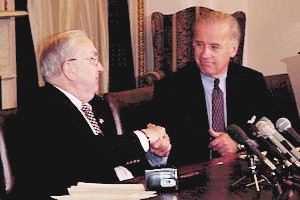
Ambassador Nomination Battle
In 1997, Helms fought a long, public battle to block the nomination of Bill Weld, the Republican Governor of Massachusetts, as Ambassador to Mexico. Helms refused to hold a committee meeting for a confirmation hearing. Weld said he was "not Senator Helms's kind of Republican." Weld's nomination eventually failed.
Cuba Policy
In January 1998, Helms supported a plan to give $100 million in food and medicine to Cuba. This aid would go through private groups, not the Cuban government. Helms said that Pope John Paul II's visit to Cuba had "created a historic opportunity." In May 2001, Helms worked with Democrat Joe Lieberman on a bill to give $100 million in aid to government critics in Cuba. Helms believed this would help those working for change on the island.
Final Senate Years
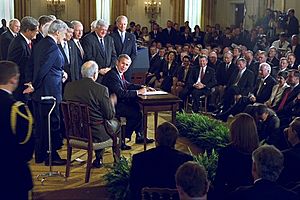
In January 1997, during the hearing for Secretary of State nominee Madeleine Albright, Helms said he hoped she would bring change. Two months later, Albright traveled with Helms to his childhood home. They discussed a treaty to ban chemical weapons.
In March 1998, the Senate Foreign Relations Committee voted to add Poland, Hungary, and the Czech Republic to NATO. Helms predicted the vote would pass easily.
Helms strongly opposed the Rome Statute, which created an international criminal court. He said any attempt to have the Senate approve it would be "dead on arrival." He also introduced the American Service-Members' Protection Act. This law protects U.S. military personnel from being prosecuted by this international court.
In 1999, Bono met with Jesse Helms to talk about increasing American aid to Africa. Helms was concerned about the spread of AIDS in Africa. He worked on a bill that authorized $600 million for international AIDS relief efforts. In 2002, Helms said he was ashamed he had done so little to fight AIDS during his time in the Senate. He promised to do more in his last months.
Retirement
Helms did not seek re-election in 2002 because of ongoing health problems. These included bone disorders, prostate cancer, and heart disease. His Senate seat was won by Republican Elizabeth Dole.
After the Senate (2003–2008)
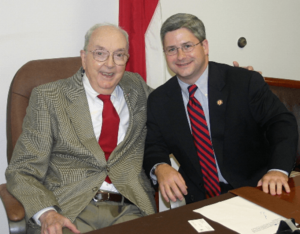
In 2004, Helms supported the election of Republican U.S. Representative Richard Burr. Burr won the other North Carolina Senate seat. In September 2005, Helms published his memoir, Here's Where I Stand.
In 1994, Helms chose Wingate University to keep his official papers and historical items from his Senate career. The Jesse Helms Center is located there. In 2005, Liberty University opened the Jesse Helms School of Government. Helms was present at the dedication.
Death
Helms's health was poor after he retired in 2003. In 2006, news reports said he had multi-infarct dementia. This condition causes memory loss and reduced thinking ability. Jesse Helms died on July 4, 2008, at age 86. He is buried in Historic Oakwood Cemetery in Raleigh, North Carolina.
Social and Political Views
Views on Race
Jesse Helms was often accused of racism during his career. David Broder of The Washington Post wrote that Helms was "the last prominent unabashed white racist politician in this country." He said Helms was willing to use racial tensions to gain political support.
Early in his career, Helms supported Willis Smith in a 1950 Senate campaign. Smith's campaign used messages that focused on race to attract white voters.
Helms was against busing and the Civil Rights Act of 1964. He called the Civil Rights Act "the single most dangerous piece of legislation ever introduced." In 1982, he voted against extending the Voting Rights Act.
Helms reminded voters that he tried to stop the Senate from approving a federal holiday for Dr. Martin Luther King Jr. He led a 16-day filibuster against it. He was accused of being a segregationist by some. Helms believed that integration would have happened on its own. He said it was forced by "outside agitators."
In 1996, the Department of Justice criticized Helms's 1990 campaign. The campaign sent 125,000 postcards to mostly African-American homes. These postcards incorrectly warned people they could go to jail if they had not updated their addresses.
Helms also blocked many black judges and appointees from federal positions. However, in 1991, Helms voted to confirm Clarence Thomas, an African-American, to the Supreme Court.
Views on Gay Rights
Helms had strong negative views on rights for gay people. He tried to cut funding for the National Endowment for the Arts. He said it supported "gay-oriented artwork." In 1993, he held up the confirmation of Roberta Achtenberg, an openly gay woman, for a government position.
During his 1990 campaign against Harvey Gantt, Helms ran TV commercials. These ads accused Gantt of seeking support in gay communities. They also claimed Gantt supported "mandatory gay rights laws," including "requiring local schools to hire gay teachers."
In 1993, Helms voted against confirming Ruth Bader Ginsburg to the Supreme Court. He said one reason was her support for "the homosexual agenda."
Religious Views
Helms was known for his strong Christian religious views. He played a big part in the growth of the Christian right. He was a founding member of the Moral Majority in 1979. Helms was a Southern Baptist. He worshipped at Hayes-Barton Baptist Church in Raleigh. He served as a deacon and Sunday school teacher there.
Helms was close to Billy Graham, Charles Stanley, Pat Robertson, and Jerry Falwell. Jerry Falwell's Liberty University named its Jesse Helms School of Government after him. Helms helped start Camp Willow Run, a Christian summer camp. He was on its board until he died.
Helms believed that the U.S. was declining because it was losing its Christian faith. He often said, "I think God is giving this country one more chance to save itself." He believed that capitalism was supported by the Bible.
Awards
Helms received honorary degrees from several religious universities. These included Bob Jones University, Campbell University, Grove City College, and Wingate University.
- Taiwan: Order of Propitious Clouds with Grand Cordon (2002)
Selected Works
- "Saving the UN: a challenge to the next Secretary-General." Foreign Affairs 75 (1996): 2+ online
- "What Sanctions Epidemic? US Business' Curious Crusade." Foreign Affairs (1999): 2–8. in JSTOR
- When Free Men Shall Stand (1976); Zondervan Pub. House.
- Empire for Liberty: A Sovereign America and Her Moral Mission (2001); by National Book Network.
- Here's Where I Stand: A Memoir (2005); New York: Random House.
Images for kids
-
Advice from Jesse A. Helms Sr., to his son; Jesse Helms Center in Wingate, North Carolina
-
U.S. Senator Richard Russell Jr. of Georgia told Helms in 1952 that he hoped Helms would one day become a senator; Helms achieved this 20 years later.
-
Helms with Joe Biden in 1999
-
Helms watches President George W. Bush sign H.J. Resolution 114 authorizing the use of force against Iraq in 2002
-
Helms with Patrick McHenry in 2005
-
The Jesse Helms Center is located next to the Wingate Town Hall.
See also
 In Spanish: Jesse Helms para niños
In Spanish: Jesse Helms para niños


